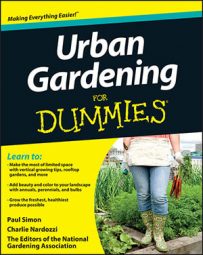Many urban farmers favor organic fertilizers over chemical ones for several reasons. Although organic fertilizers may be slower to release their nutrients, they offer you and your garden many advantages:
Organic fertilizers feed the soil by supplying nutrients to microbes that help keep a healthy, balanced soil ecosystem. These microbes help fight disease organisms, supply secondary nutrients and micronutrients, and create humus that helps with water and nutrient uptake.
Most organic fertilizers supply a slow, steady release of nutrients to the plants. They feed plants over time and don’t give them just a quick shot of nutrients.
Organic fertilizers are more widely available than ever before.
Organic fertilizers can be free — if you make your own teas and compost.
The biggest benefits of chemical fertilizers are that they come in granular and liquid forms, they’re widely available, and they tend to be less expensive than manufactured organic fertilizer. However, many avoid using them for the following reasons:
Chemical fertilizers don’t add organic matter or feed the soil’s microorganisms. Chemical fertilizers are like taking a vitamin pill, while organic fertilizers are like eating a good meal.
Most chemical fertilizers act quickly and don’t have any staying power to feed plants over time. The exception is the time-release fertilizer that releases chemicals slowly into the soil over time. You add these small pellets around plants and in containers, and as you water them or as rain falls, the pellets release chemicals. But they still don’t provide organic matter.

